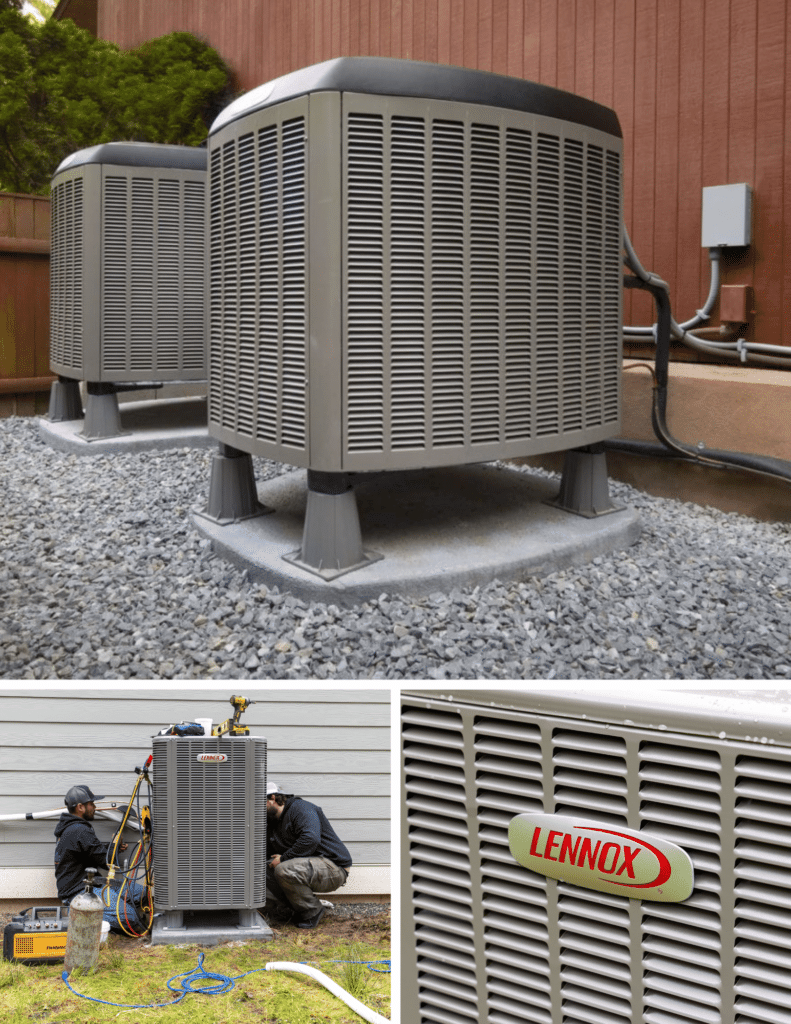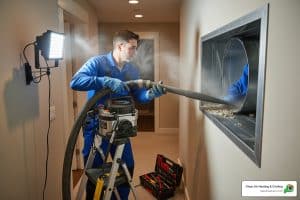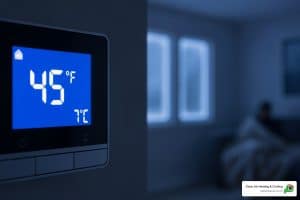Why Heat Pump Installation is a Smart Choice
Looking for an efficient way to control your home’s temperature? A heat pump installation could be your ideal solution. Heat pumps are advanced systems that provide both heating and cooling, offering comfort all year round.
Quick Answers:
- What is a heat pump? It’s a device that transfers heat from outdoors to indoors, or vice versa, to heat or cool your home.
- Why install a heat pump? They’re energy-efficient, environmentally friendly, and can reduce your utility bills.
- How efficient are heat pumps? They are often three to five times more efficient than traditional HVAC systems.
- Seasonal benefits? Heat pumps provide cool air in summer and warm air in winter, making them versatile and cost-effective.
Understanding the basics of a heat pump can help make an informed decision. These devices work by transferring heat rather than generating it—allowing them to operate much more efficiently than traditional furnaces and air conditioners. Installing a heat pump can drastically cut your energy bills and is a step towards a more sustainable lifestyle.
To get an expert overview of the entire installation process, potential costs, and the long-term benefits, keep reading.

Understanding Heat Pump Installation
Choosing the Right Heat Pump
When it comes to heat pump installation, picking the right type is crucial. Homeowners can choose between air-source and ground-source heat pumps.
- Air-source heat pumps are the most common and are generally easier and cheaper to install. They work by transferring heat between your home and the outside air.
- Ground-source heat pumps (also known as geothermal heat pumps) are more efficient but come with a higher cost and complexity. They transfer heat between your home and the ground or a water source.
Sizing is another important factor. A heat pump that is too small will struggle to heat or cool your home, while an oversized unit will cycle on and off too frequently, wasting energy. Generally, a professional assessment is recommended to determine the right size for your home.
SEER (Seasonal Energy Efficiency Ratio) and HSPF (Heating Seasonal Performance Factor) ratings help gauge a heat pump’s efficiency. The higher the SEER and HSPF ratings, the more efficient the unit. For example, a SEER rating of 17 or higher is considered highly efficient.
Preparing for Installation
Before diving into the installation process, preparation is key to ensure your heat pump performs efficiently.
Home Efficiency: Older homes with poor insulation and air leaks may not be ideal for heat pumps. Improving your home’s insulation and sealing air leaks can make a significant difference.
Insulation: Make sure your home is well-insulated. This helps the heat pump maintain a consistent temperature, reducing its workload and increasing efficiency.
Duct Assessment: If your home has existing ductwork, it should be assessed for leaks and proper insulation. Poorly maintained ducts can cause significant energy loss.
Installation Process
Installing a heat pump involves several steps and it’s best to hire a professional to ensure everything is done correctly.
- Site Preparation: Clear the area where the heat pump will be installed. This includes leveling the ground and placing a composite pad for the outdoor unit.
- Disconnecting Old Units: If you’re replacing an old system, professionals will safely remove it, capturing any hazardous refrigerants according to EPA standards.
- Indoor and Outdoor Units: The heat pump system includes both indoor and outdoor units. The indoor unit (like the evaporator coil) is connected to the outdoor unit via refrigerant lines.
- Line Sets, Wiring, and Valves: Professionals will install new refrigerant lines, ensuring they are welded properly to avoid leaks. New electrical wiring is also installed to power the heat pump.
- Testing and Calibration: Once installed, the system is tested and calibrated to ensure it operates efficiently.
Professional Requirements and DIY Potential
While the idea of saving money by doing a DIY installation might be tempting, it’s usually not recommended. Heat pumps are complex systems that require knowledge of HVAC, electrical, and refrigerant systems. Mistakes can be costly and even dangerous.
Moreover, some areas require professional installation for certain types of heat pumps, especially those involving dual-fuel gas lines.
Hiring a professional ensures that the installation meets all safety standards and local codes. It also guarantees that the system is optimized for performance, potentially saving you money in the long run through increased efficiency and fewer repairs.
By understanding the types of heat pumps, preparing your home, and knowing the steps involved in installation, you can make an informed decision that will keep your home comfortable and energy-efficient.
The Cost of Installing a Heat Pump
Installing a heat pump is a significant investment, but understanding the costs and potential savings can help you make an informed decision.
Breaking Down Installation Costs
The cost of installing a heat pump can range widely, from $1,500 to $20,000, with an average price of $10,750. This variation depends on several factors:
- Type of Heat Pump: Air-source heat pumps are generally more affordable, while geothermal systems can be on the higher end due to additional contract work like excavation.
- Size of Your Home: Larger homes require bigger or multiple units, increasing both equipment and labor costs.
- Efficiency: High-efficiency models cost more upfront but offer greater long-term savings.
Labor costs typically include the following steps:
- Thermostat Wiring: Inspection and potential upgrades.
- Outside Unit Installation: Positioning and connecting the heavy outdoor unit.
- Electrical System Connection: Ensuring the heat pump is safely wired into your home’s electrical system.
Equipment costs cover:
- Heat Pump Unit: The main component, which varies in price based on type and efficiency.
- Indoor Unit: Either a coil or air handler.
- Thermostat and Sensors: For controlling the system and optimizing performance.
Additional materials might include:
- Ductwork Modifications: Necessary if your home’s existing ducts need adjustments.
- Permits and Inspections: Required by local authorities to ensure safety and compliance.
- Filters: Typically a high-efficiency filter to maintain air quality.
Potential Financial Incentives
There are several ways to offset the initial investment of a heat pump through financial incentives:
- Tax Credits: Thanks to the Inflation Reduction Act, you can receive a tax credit of 30% of the total project cost, up to $2,000.
- Rebates: Many states and local utilities offer rebates for installing energy-efficient heat pumps. Check out the North Carolina State University database for state-specific incentives.
- Utility Savings: Heat pumps are highly efficient, potentially reducing your utility bills by $100 to $1,300 annually, according to the National Renewable Energy Laboratory.
Long-Term Savings
While the upfront cost may seem high, the long-term savings make heat pumps a smart investment. High-efficiency heat pumps can convert up to 550% of the energy they consume into useful heat, far surpassing even the best gas furnaces, which max out at 95%.
Additional benefits include:
- Reduced Dependency: Less reliance on separate heating and cooling systems.
- Lower Maintenance Costs: Fewer repairs and replacements over time.
- Environmental Impact: Significant reduction in carbon footprint compared to traditional HVAC systems.
By considering these factors and potential savings, you can see why investing in a heat pump can be a wise financial decision for your home.
Common Questions About Heat Pump Installation
How Much Does It Cost?
The cost to install a heat pump can range significantly, from $1,500 to $20,000, with the average price being around $10,750.
Factors affecting cost:
- Type of Heat Pump: Ductless mini-splits are on the lower end, while geothermal systems are on the higher end.
- Home Size: Larger homes require more extensive systems.
- Additional Work: Geothermal pumps may need excavation, increasing costs.
Can I Install a Heat Pump Myself?
DIY Considerations:
While installing a heat pump yourself can save on labor costs, it’s not recommended unless you have HVAC experience.
Professional Help:
Hiring a professional ensures the installation is done correctly and safely. Professionals also handle:
- Electrical Connections: Ensuring they meet local codes.
- Refrigerant Handling: Properly charging the system.
- Ductwork: Modifying or installing new ducts if necessary.
Tools Needed:
If you decide to attempt a DIY installation, you’ll need:
- Drills and Screwdrivers
- Refrigerant Gauges
- Electrical Testing Equipment
What Are the Long-Term Benefits?
Energy Savings:
Heat pumps are highly efficient, converting up to 550% of the energy they consume into useful heat. This efficiency translates to lower utility bills.
Environmental Impact:
By using electricity instead of fossil fuels, heat pumps reduce your carbon footprint. They are a greener alternative to traditional HVAC systems.
Utility Bills Reduction:
Over time, the energy savings can offset the initial installation costs. Regular maintenance ensures the system operates efficiently, further reducing utility bills.
Additional Considerations
Maintenance Needs:
Regular maintenance is crucial for keeping your heat pump running efficiently. This includes:
- Cleaning or Changing Filters: Every 1-3 months.
- Inspecting the Outdoor Unit: Removing debris and ensuring proper airflow.
- Scheduling Professional Maintenance: At least once a year.
Lifespan:
With proper maintenance, a heat pump can last between 10 to 20 years. However, this can vary based on usage and local climate conditions.
By addressing these common questions, you can make an informed decision about heat pump installation, ensuring it meets your needs and budget.
Advanced Heat Pump Technologies
Efficiency and Performance
Modern heat pumps come with advanced technologies that can significantly improve their efficiency and performance. Let’s dive into some of the key features:
Inverter Technology
Inverter technology allows the heat pump to adjust its output continuously, rather than cycling on and off like traditional systems. This means it can run at lower speeds for longer periods, maintaining a consistent temperature while using less energy.
- Benefits: Reduces wear and tear, lowers energy consumption, and provides better temperature control.
- Example: A Mitsubishi Hyper Heat mini-split can operate efficiently even at temperatures as low as -13°F.
Hybrid Systems
Hybrid systems combine a heat pump with a traditional furnace. The heat pump handles the heating and cooling when temperatures are moderate, and the furnace kicks in when it gets extremely cold.
- Benefits: Provides the best of both worlds—high efficiency in moderate climates and reliable heating in extreme cold.
- Example: A home in West Virginia using a hydronic LP-fired radiant floor heating system paired with a mini-split AC for occasional use.
Smart Controls
Smart controls allow homeowners to manage their heat pump systems remotely via smartphones or smart home devices. These systems can learn your habits and adjust settings automatically to maximize comfort and efficiency.
- Benefits: Convenience, energy savings, and better system monitoring.
- Example: A smart thermostat can lower the temperature when you’re away and warm up the house just before you return.
SEER and HSPF Explained
- SEER (Seasonal Energy Efficiency Ratio): Measures the cooling efficiency of the heat pump. The higher the SEER rating, the more efficient the unit is.
- Range: Typically 13 to 25+. Higher SEER ratings mean lower energy bills in summer.
- HSPF (Heating Seasonal Performance Factor): Measures the heating efficiency. A higher HSPF indicates better performance.
- Range: 7.7 to 13. Higher HSPF ratings mean lower energy bills in winter.
Impact on Utility Bills
Using a heat pump with high SEER and HSPF ratings can lead to significant savings on utility bills. For instance, homes with Energy Star electric heat pumps can spend less than $600 on heating during winter, much lower than homes using traditional systems.
Optimal Settings
To get the most out of your heat pump:
- Set It and Forget It: Avoid frequent temperature adjustments. Let the system maintain a steady temperature.
- Regular Maintenance: Keep filters clean and schedule annual professional check-ups.
- Smart Thermostats: Use smart controls to optimize settings based on your schedule and weather conditions.
By understanding these advanced technologies and how they impact efficiency and performance, you can make informed decisions about your heat pump installation and enjoy long-term savings and comfort.
Conclusion
Long-Term Value
Investing in a heat pump is a smart move for the long haul. Heat pumps offer dual functionality—heating in the winter and cooling in the summer—making them a versatile and cost-effective choice. They help reduce dependency on separate heating and cooling systems, cutting down on both operational costs and energy consumption.
According to the Northeast States for Coordinated Air Use Management, heat pumps are expected to become the norm for residential HVAC systems, with a target for 90% of new home equipment sales by 2040. This trend underscores the long-term value and sustainability of heat pumps.
Clean Air Heating & Cooling
At Clean Air Heating & Cooling, we pride ourselves on delivering top-notch heat pump installation services. Our experienced team ensures that your system is installed correctly and efficiently. We understand that every home is unique, and we tailor our services to meet your specific needs.
We also provide a comprehensive walkthrough of safety, maintenance, and thermostat operations to ensure you get the most out of your new system.
Customer Satisfaction
Your comfort and satisfaction are our top priorities. We aim to make the heat pump installation process as smooth and hassle-free as possible. Our technicians are trained to handle any challenges that may arise, ensuring that your home remains comfortable year-round.
We also take care of the clean-up process, leaving your home as immaculate as we found it. This attention to detail has earned us a loyal customer base and numerous positive reviews.
25% Utility Savings Guarantee
One of the biggest benefits of installing a heat pump is the potential for significant utility savings. We are so confident in the efficiency of our systems that we offer a 25% Utility Savings Guarantee. This means you can expect to see a substantial reduction in your energy bills, making the initial investment well worth it.
If you’re ready to enjoy the long-term value and comfort a heat pump can bring, contact us today for a free estimate. Our team at Clean Air Heating & Cooling is here to help you every step of the way.





